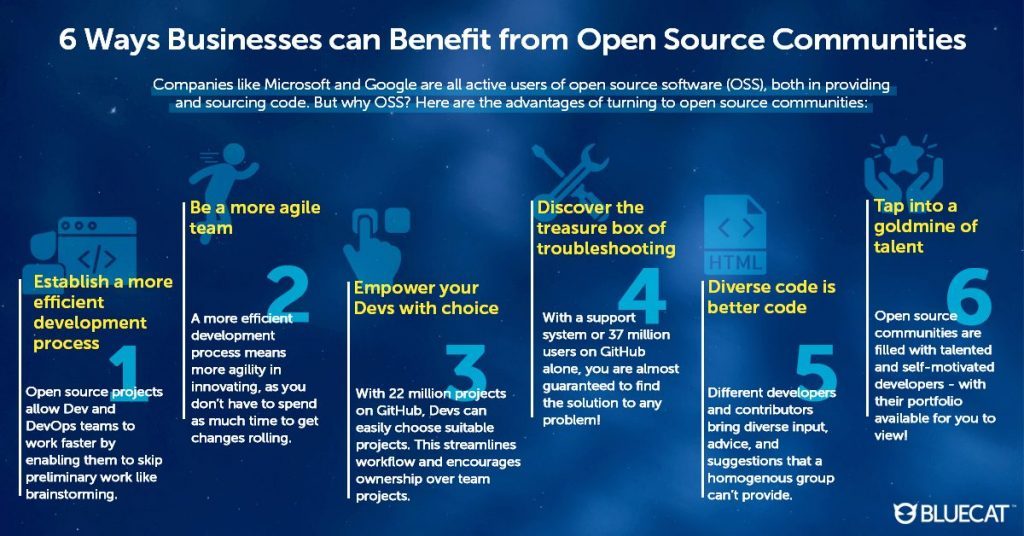The community-powered advantage for your organization
Embracing open-source software and taking a community-powered approach to development can result in speed and agility. Learn more with BlueCat.

Every program, script, API, or application is a solution to a problem. Developers can create code to reshape everyday life or change entire experiences for others. This is the ripple effect software can have in a world reliant on the technology we use.
Open-source software (OSS) empowers problem solvers. Unlike proprietary software, OSS copyright holders allow unrestricted access to source code and allow others to freely use, change, and distribute it. You may be surprised by how many companies leverage open source technologies. Microsoft, Facebook, and Google sound familiar?
Why do these massive companies turn to community-powered software? Surely they have the resources to invest in any project whenever they want. But dollars and cents aside, it’s about speed and agility.
Getting a head start with software development
GitHub is a popular choice to host open-source projects. It’s home to over 22 million projects or repositories. That means companies and developers have their pick of projects to work on. Without any initial investment, development teams can effortlessly create applications. OSS projects include the source code, documentation, release notes, and much more – all of which give Dev teams all they need to get a head start. Square one for them is beyond the brainstorming, trial and error, and testing required to build a functional application.
As companies continue to invest in DevOps and software-defined initiatives, tapping into open-source communities is to their advantage. Development becomes highly efficient, allowing DevOps teams to be more agile. And there’s more room for innovation when the team isn’t bogged down with getting the ball rolling.
Let the Dev team lead the way into open source
If you’re beginning to see how a community-powered approach is part of a winning strategy, that’s a start. But how do you actually take the first step?
Turn to your developers. Open-source communities are a playground for curious and ambitious developers. With an endless library of projects available at their fingertips, give them the power to choose what they think can help their mandate and the team’s mission. That’s just one of the advantages of participating in the open source community: choice.
There are two additional factors you should consider along with your developer: programming language and project volume.
| Programming language | What language is your team proficient in?
Is this an opportunity to learn a new programming language? Is the language of choice well supported? |
|---|---|
| Project volume | How mature is the project? Is it beginner-friendly or advanced?
Can your team follow the established standards for that project? Do your team’s skills match the level that’s expected of contributing developers? |
The power of community-powered
Once your team gets into the weeds of writing code, the community is a valuable troubleshooting resource. Consider how many users are on GitHub: 37 million. When they run into a problem, they’re bound to find someone that had a similar experience or at least someone that can help.
If you decide to host your project in these communities, then you’re finally tapping into the most powerful part of a community-powered approach: crowdsourcing. Diversity makes code better. Different developers and contributors bring different experiences and perspectives. They provide a 360-view that a homogenous group simply can’t.
The volume of people you can connect with through GitHub or Bitbucket is extensive. For one, you’re tapping into hundreds or thousands of developers to help advance with your project. But it’s also valuable for finding or attracting untapped developers. People in open-source communities are naturally self-motivated. You also have access to their portfolio of work.
Here’s an infographic summing up the advantages of tapping into open source communities:

BlueCat and the open-source community
At BlueCat, we’ve embraced community-powered innovation for our network automation platform. BlueCat Gateway empowers users to automate DNS, DHCP, and IP address management (IPAM) workflows. Our GitHub repository, BlueCat Labs, contains contributions from BlueCat engineers and community members. Just in the last year, the number of workflows have more than doubled. As contributions grows, more users and businesses can embrace and yield the fruits of network automation.




